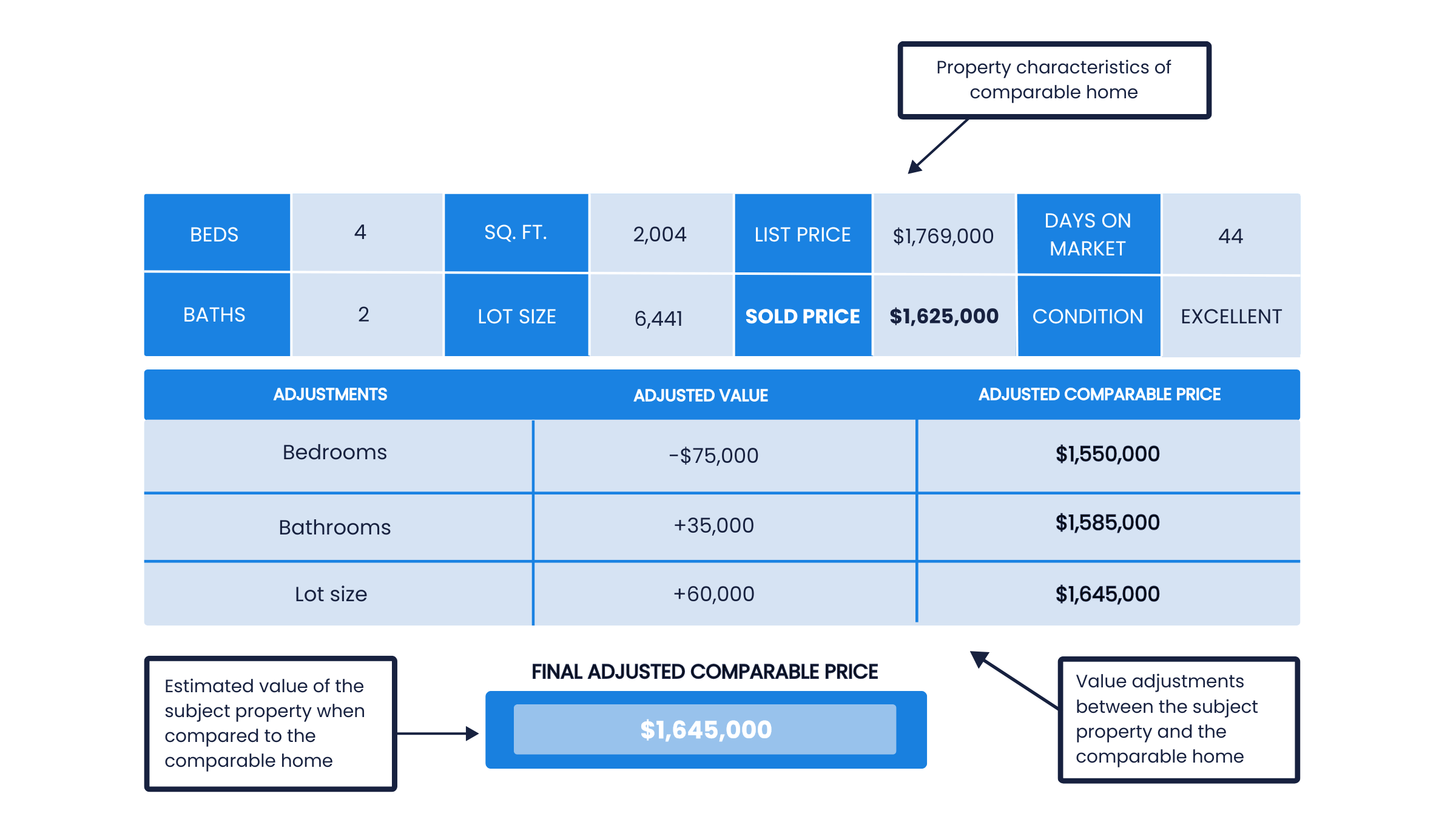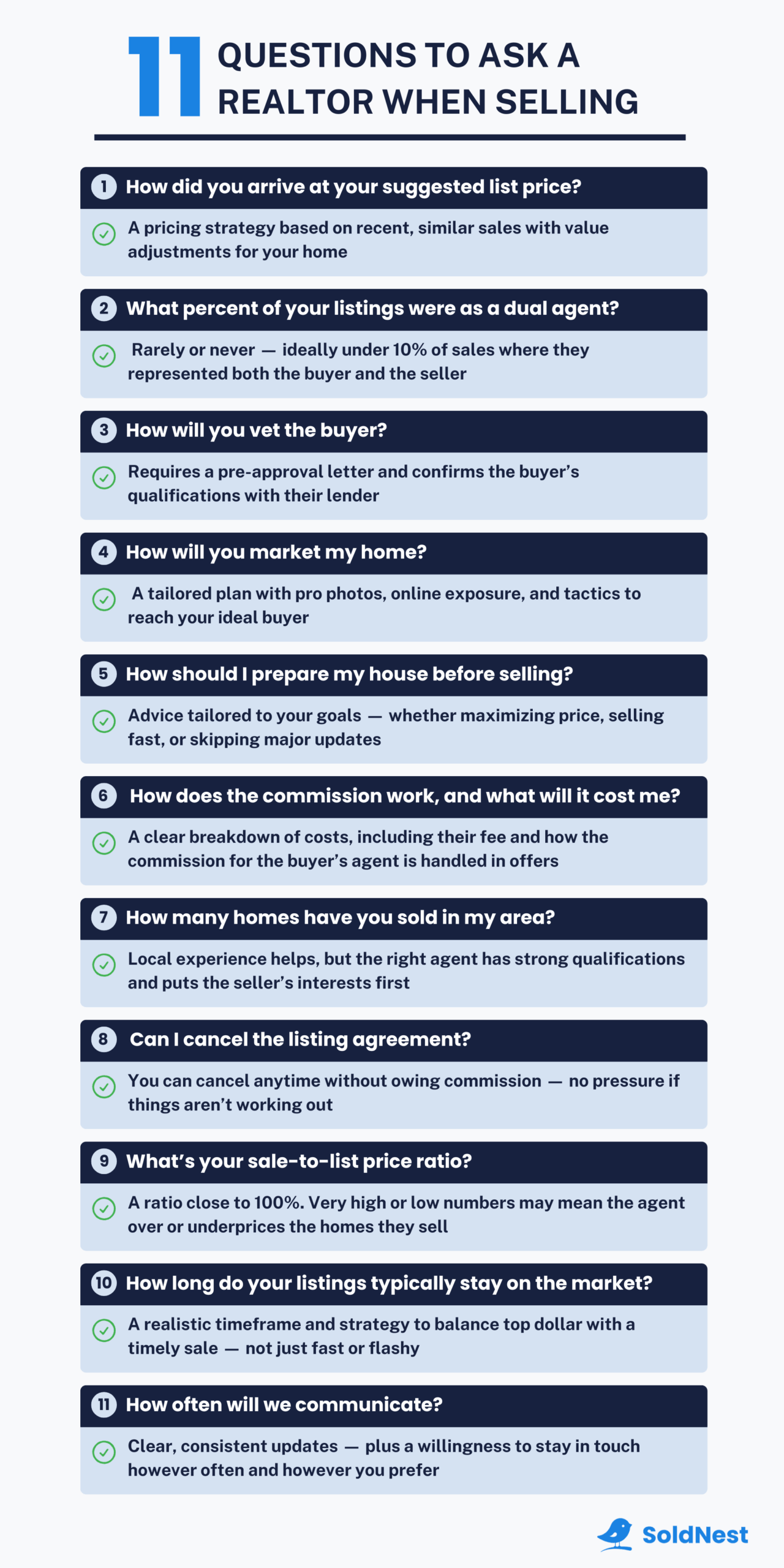The questions you ask a real estate agent when selling a house are crucial.
Why?
Because the right Realtor can sell your home faster and make you more money (especially in a shifting market).
And they can make the selling process much less stressful too.
Commit to the wrong agent and it can be the complete opposite.
But how do you know if you’re hiring the right Realtor?
You need to ask the right questions when interviewing them.
And here’s the key…
It’s not just about knowing which questions to ask a potential Realtor.
It’s about getting the right answers.
There are two questions that are so important that, in my opinion, if you don’t get the right answers, you shouldn’t hire them — no matter who they are (I’ll tell you which questions these are).
Here is a list of the key questions to ask a real estate agent before deciding who to work with.
1. How did you arrive at your suggested list price?
Notice that this question isn’t, “What do you think my list price should be?”
That’s because every real estate agent will tell you what they think you should list your house for.
The “how” is much more important.
So the Realtor you’re interviewing should do more than just provide a verbal response.
They should back their answer with a comparative market analysis (CMA).
This is an analysis agents put together that compares your property to the best recently sold homes (also known as “comps”).
It’s similar to a property appraisal but can be more precise when provided by the right agent.
Pay close attention to:
- Which properties the agent compares yours to (known as “comps”)
- How the agent adjusts the price for key features of your home.
The comparable homes should be:
- Close in proximity to your property
- Recently sold
- Similar in interior square footage.
Here’s something that’s not uncommon…
Some agents will share the comps they used to determine the list price without further explanation.
If that’s the case, be sure to ask this follow-up question.
How does my home compare to the properties you used as comps?
The agent should clearly explain how your home compares to each property.
They should do this by making price adjustments for key differences that can impact your potential selling price.
Some examples include:
- Square footage
- Condition
- Bedrooms
- Bathrooms
- Lot size
- Schools
- Proximity to road noise.
Here’s an example of what this comparison might look like:

Making the right price adjustments is critical to setting the right price for your home.
And the right asking price is key to maximizing your offer price and selling quickly.
Your house is worth what someone is willing to pay for it, but the listing price sets the initial tone.
Set the price too high and you’ll discourage motivated buyers from visiting.
Price too low and you could be leaving money on the table.
So consider it a red flag if a prospective Realtor cannot answer this question with a thorough explanation of how they arrived at their suggested list price.
Pro tip: Some listing agents will intentionally use inaccurate comps or questionable price adjustments.
They do this to convince you that they can magically sell your home for a price too good to be true.
This is one of the reasons why disclosing what you think your house is worth is one of the things you should avoid telling your listing agent.
So trust your instincts if a real estate agent suggests a price that feels unrealistic.
This is a common tactic that can easily cause your house to sit on the market.
One of the upcoming questions will help you significantly reduce the chances of this happening to you.
2. In what percentage of your home sales have you acted as a dual agent?
If there’s one question you need to make sure you ask a real estate agent, this is it.
Why?
Because their answer is a strong indicator of whether they’ll look out for your best interests.
Can an agent who is selling a house also represent the buyer?
Yes.
Should they also represent the buyer?
In most cases, no.
Here’s why…
A real estate agent earns two commissions if they represent both the seller and the buyer in the same transaction.
You can probably see where this is headed.
Many listing agents are willing to risk their integrity to act as a dual Realtor.
By “risk their integrity,” I mean:
- Convince you to accept an offer that favors their buyer
- Limit the marketing of your home, without you knowing
- Not present all offers to you
- Minimize their negotiating effort with buyer agents so that you accept their buyer’s offer.
I know, that seems exaggerated.
But it’s not.
I’ve witnessed agents use these tactics firsthand countless times.
And in most cases, the home sells for a far lower price than it would have if the agent had been only representing the seller.
The Realtors who have a higher-than-average number of dual agent sales are the agents who prioritize a higher commission above their clients’ best interests.
That’s why this question is so important.
And it’s why we consider this a critical part of our screening process when matching a seller with a top local listing agent.
The acceptable percentage can sometimes be a bit above 10% in lower-priced areas across the U.S.
But very rarely will we recommend a Realtor who has represented both the seller and buyer in the same transaction in more than 10% of their sales.
And you shouldn’t hire them if the answer you get is anything higher than that.
If you do, you’ll be selling with an agent who has a proven track record of putting their own paycheck ahead of securing the best possible price for their client.
Pro tip: Before your initial consultation, ask the agent to bring a printout of all of their transactions.
This will allow you to see the percentage of their sales where they represented both parties, which will eliminate their ability to not be up front about their true dual agency percentage.
3. How will you vet the buyer?
Failing to thoroughly vet a buyer is a common reason homes end up back on the market after an offer has been accepted.
This often happens when buyers include one or more contingencies in their offer and then fail to secure financing.
Ideally, the agent’s answer should include that they will:
- Require a pre-approval letter to accompany any offer
- Contact the buyer’s lender upon receiving the offer to confirm the buyer’s qualifications.
You’ll also want to know what specific questions the Realtor plans to ask the loan officer.
For example, they might ask: “What is the source of the buyer’s down payment?”
Or…
“What’s the buyer’s debt-to-income ratio?”
An agent who responds this way demonstrates they’re proactive in ensuring the buyer is financially qualified.
This level of diligence matters…
Being at or above the lender’s debt-to-income threshold is one of the most common reasons buyers fail to secure financing.
It’s an added bonus if they mention how they can leverage this information during negotiations.
Why?
Because being at the maximum debt-to-income ratio is a common excuse buyers’ agents use to justify why their client can’t increase their offer.
So if a Realtor explains how they’ll use this information, that shows they understand how to negotiate effectively for the best price and terms.
This is where a listing agent’s expertise truly stands out.
And that’s why asking about the buyer vetting process is one of the key interview questions to ask a real estate agent.
4. How will you market my home?
Any agent can list your home on the MLS and put a for sale sign in your yard.
But the best agents will incorporate the right marketing plan to sell your home for the highest price — and in the shortest time.
A strong marketing plan consists of:
- Knowing the selling features of your property
- Knowing who your ideal buyer is
- Maximizing the reach to your target buyer.
So don’t just ask, “How will you market my home?”
Probe further by asking these questions…
What are the selling features of my house?
Every property has selling features.
It doesn’t matter if the home is in great condition or a fixer-upper.
An exceptional real estate agent knows how to highlight the best features of any property and leverage them to attract the right buyers.
For example, the two selling features for a home in need of updating could be the following:
- Lower price compared to nearby listings, which means lower monthly payments and lower property taxes
- The opportunity for the buyer to add their “own artistic touch.”
Asking which features the agent plans to highlight can give you insight into their expertise.
Who do you think the buyer for my home will be?
An agent who doesn’t know how to pinpoint your ideal buyer is less likely to create the competition needed to maximize your sale price.
That’s why asking your Realtor about your target buyer is important.
Of course, the buyer for your home can be anyone.
But every property appeals to certain demographics more than others.
For example…
A buyer for a condo in San Francisco is probably going to be different than a buyer for a single-family residence in a suburban neighborhood.
And a buyer for a home listed in a retirement community is going to be different from a buyer for a home in Downtown Austin.
The answer you’re looking for should be specific and detailed.
How do you plan on marketing to my target buyers?
Many real estate agents will discuss the following when you ask this question:
- Multiple listing service (also known as “MLS“)
- Syndication to real estate portals (Zillow, Redfin, Trulia, etc.)
- List price
- Photos
- Flyers/brochures.
The agents who are willing to deploy additional marketing resources might also mention some of these:
- Video
- 3D walkthrough
- 2D floor plan
- Social media ads
- Top agent networking
- Home staging.
Learning how an agent plans to market your listing is standard practice.
But this is when a standout listing agent will explain how they’ll bring everything together to attract the right buyer.
Their answer will clearly explain that marketing your selling features to the right audience — and through the right channels — will put you in the best position to sell quickly and for the best price.
5. How should I prepare my house before selling?
Inquiring about how to prep your home provides an opportunity to receive tailored advice from a professional.
And it should be advice that fits your unique situation.
That’s what you want to listen for when asking an agent this question.
Let them know what your goals are.
Do you want to maximize your sales price and have the budget and time to make the best improvements?
Then the agent’s answer should include which repairs and upgrades can maximize your home’s appeal — at the lowest cost.
Are you planning to list soon and open to making minor improvements that could help attract the right buyer?
Their response should highlight quick, high-impact changes that offer a strong return on your investment.
Or is your plan to sell your home in its current condition?
If so, their answer should include tips on simple, low-cost ways to make your property more presentable.
You should also let them know if you’ll be occupying the property when it’s listed.
Because a real estate agent’s advice can vary depending on whether the home is vacant or occupied.
Do you need recommendations for trusted service professionals (plumbers, contractors, painters, etc.)?
Then be sure to ask them.
Many real estate agents have a rolodex of contacts — and some will handle the prepping process for you.
The key when asking a Realtor this question is to listen to their feedback after you share your goals.
Because their response will demonstrate how well they listen.
6. How does the real estate commission work, and what will it cost me?
The Realtor you’re interviewing should be very clear about how the real estate commission works.
Because agent compensation works a bit different since the lawsuit settlement with the National Association of Realtors.
Here’s a high-level overview of what the agent’s answer should convey…
Prior to the NAR lawsuit, the total commission a seller paid was outlined in the agreement they signed with their agent.
This included the compensation paid to their agent’s brokerage and the buyer agent’s broker (usually 5-6% of the final sales price and split 50/50).
Now, only the commission paid to the seller’s agent is stated in the listing contract.
The commission for the buyer’s agent is included in the buyer’s offer.
Which means a seller can negotiate (counteroffer) with the buyer for their agent’s commission.
So…
You should have an understanding of how the commission works before hiring a real estate agent — and what the agent’s listing fee is.
You can also ask them for an estimated settlement statement (or “net sheet”).
This is a document that will show all of your closing costs (escrow fees, title fees, county/city transfer taxes, etc.).
And it’s a good idea to confirm whether there are any additional selling fees.
One thing you shouldn’t do?
Don’t make paying the lowest commission your top priority.
Many low commission agents lack experience — or operate on a high-volume, quick-turnover model that sacrifices the effort needed to get you the highest possible price.
But probe a bit more by asking this next question…
Will you lower your commission?
This question is putting your potential real estate agent to the test.
Pay close attention to how they respond.
The ideal answer should immediately explain why that agent’s commission is justified.
You want to hear them “put up a fight.”
The response you don’t want to hear is an immediate “yes, I’ll lower the commission,” or a very weak reply.
I’d consider this a red flag.
Why?
Because if that Realtor doesn’t defend their financial interest, it’s highly likely that they won’t defend yours.
7. How many homes have you sold in my area?
Many sellers ask a real estate agent this question because they believe it’s a necessity.
It’s not.
But there’s a reason why I included it.
The internet.
Today, most buyers search online and are able to find out almost everything they need to know about a neighborhood.
When I say everything, I mean everything…
- Schools
- Shopping
- Proximity to freeways
- Crime
- Recent sales
But there are some things about a neighborhood that buyers won’t be able to find online.
This is why hiring a real estate agent with at least some experience selling properties in your local market is important.
However…
Don’t dismiss an agent’s answer if they lack experience selling homes near yours.
A savvy agent can do their homework and gather the necessary information to provide the best representation.
But partnering with an inexperienced agent can significantly reduce your chances of a successful home sale.
So experience matters — but it’s not the only factor you should consider when deciding how to choose a Realtor.
You also need someone who will prioritize your sale and act in your best interests.
That’s why it’s important to understand their level of experience.
Ask how long they’ve been a licensed real estate professional.
You can verify this by performing a quick Google search like “Verify Realtor license in [state].”
Also ask to see their portfolio of listings sold, including when and where.
The more recent, the better.
Here’s why…
A Realtor with recent selling experience is more likely to have up-to-date knowledge of market trends, which is vital for helping you set the right listing price.
And be sure to confirm that their portfolio doesn’t include homes they’ve helped buyer clients purchase.
The answer you’re looking for should only reflect properties they’ve sold as a seller’s agent.
8. Can I cancel the listing agreement?
Inquiring about terminating the listing agreement is the second most important question to ask a real estate agent.
Here’s why…
A listing agreement is a binding contract that is almost always exclusive to you and your agent.
The typical duration ranges from 3 to 6 months.
This means that you cannot fire your agent and hire another one during this time.
This also means your agent earns a commission regardless of whether you’re satisfied with their services.
Unfortunately, some real estate agents exploit this by telling you exactly what you want to hear during your initial meeting.
For example:
- Unrealistic sale price: Promising an impractical listing price solely to secure your business.
- Guaranteeing a quick sale: Promising they can sell your home faster than anyone else without providing clear evidence or a strategy.
- Lack of follow-through on communication: Appearing highly engaged during the interview but failing to provide regular updates or maintain clear communication after being hired.
There is absolutely zero reason why you should be locked into a contract.
Even though you may not cancel the agreement, having the option to do so means the agent’s commission check is not “guaranteed.”
Which means they’ll be more motivated to sell your house quickly and for a price that you’re happy with.
That’s why having the freedom to opt out of the agent contract is one of the most important things to know before signing a listing agreement.
How important?
If the agent doesn’t quickly answer this question with “yes,” then you shouldn’t hire them.
9. What’s your sale-to-list price ratio?
Any Realtor can tell you the final sale prices of the homes they’ve sold.
What matters more is how those prices compare to the original listing prices.
In the real estate industry, this is referred to as an agent’s “sale-to-list price ratio” or “sold-to-list price ratio.”
This ratio is calculated by dividing the selling prices of all the homes an agent has sold by their original listing prices.
For example…
If an agent has an average selling price of $1,000,000 and an average listing price of $950,000, then their sale-to-list price ratio would be 105%.
You can use this number to compare different real estate agents you interview.
Be cautious of agents who answer with a number significantly higher or lower than others.
A ratio that is on the higher end means that the Realtor tends to underprice the homes they sell.
Some agents do this intentionally to create marketing opportunities, using phrases like, “Just sold for $$$ over asking price!” to attract nearby homeowners.
Usually, the listing agents who do this have a sale-to-list price ratio of 110% or higher.
Agents with a lower ratio often tend to overprice the homes they sell.
This typically happens either due to a lack of experience or because they deliberately overpromise on the selling price to win the listing.
In my opinion, anything under 95% can be a signal that the listing agent you’re questioning lacks the skills or integrity needed to deliver the best results.
10. How long do your listings typically stay on the market?
Asking this question can give you valuable insight into how efficiently a real estate agent sells their listings.
The average days on market (DOM) measures the time it takes for a home to go from being listed on the MLS to accepting an offer — not when the sale is closed.
But it’s important to remember that the time it takes to sell your home could be impacted by other factors (property type, location, functionality and floor plan, etc.).
Similar to the sale-to-list price ratio, this is another key metric you can use to compare agents.
A higher-than-average DOM indicates that the agent tends to overprice their listings.
And a lower-than-average DOM indicates the agent has a track record of underpricing the properties they sell.
You can cross-check the agent’s DOM with their sold-to-list price ratio to get a clearer picture of their approach to listing homes.
Ask the Realtor to explain how they balance getting top dollar with selling in the shortest amount of time.
Their answer will help you assess whether your goals align with their approach.
11. How often will we communicate?
Knowing how often you’ll communicate with your agent is key.
Because not all real estate transactions are smooth sailing.
Sometimes there are bumps in the road.
Ask the agent if they have a regular schedule for providing updates.
Will it be every few days? Weekly?
The ideal answer is something like, “As often as you’d like.”
What you don’t want is a real estate agent who lacks clear and consistent communication.
This is one of the warning signs of a terrible Realtor.
Your goal should be to partner with an agent who has no problem discussing the good, the bad, and the ugly.
So it’s important their answer shows they’re committed to communicating with you, no matter how well or how badly it’s going.
And confirm the method of communication so you’re on the same page (email, phone, text).
The final word
The questions you ask a Realtor are important.
It’s your opportunity to make sure the professional you’re hiring will care about delivering the best results.
This is the real estate agent you’re going to need.
Want a professional who can get you the maximum price?
You can tap into our no-cost service to ensure you sell with the right agent. (We can also provide unbiased feedback about a prospective an agent you’re considering.)
We use a unique screening process to match you with a top local agent who:
- Has experience selling in your area and price range
- Earns top-rated reviews from sellers
- Maintains a lower-than-average history of dual agency (meaning they primarily represent only you in the transaction rather than both the buyer and seller)
- Agrees to let you cancel your listing agreement if necessary.
Remember, it’s not just about knowing which questions you should ask a real estate agent.
It’s about getting the right answers.



